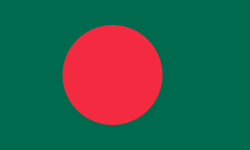
Corruption in Bangladesh has been a continuing problem. According to all major ranking institutions, Bangladesh routinely finds itself among the most corrupt countries in the world.
As of 2001, corruption in the public sector was "endemic, chronic and all pervasive".[1] In Transparency International's 2024 Corruption Perceptions Index, which scored 180 countries on a scale from 0 ("highly corrupt") to 100 ("very clean"), Bangladesh scored 23. When ranked by score, Bangladesh ranked 151st among the 180 countries in the Index, where the country ranked first is perceived to have the most honest public sector.[2] For comparison with regional scores, the highest score among the countries of the Asia Pacific region[Note 1] was 84, the average score was 44 and the lowest score was 16.[3] For comparison with worldwide scores, the average score was 43, the best score was 90 (ranked 1), and the worst score was 8 (ranked 180).[4] Introducing the 2020 Corruption Perceptions Index, Executive Director Iftekharuzzaman of Transparency International Bangladesh commented, "Of the eight South Asian countries, Bangladesh remains second lowest both in score and rank — better than only Afghanistan."[5]
The Anti Corruption Commission was formed in 2004, but is considered to be largely ineffective in investigating and preventing corruption because of governmental control over it.[6][7] The Anti Corruption Commission chairman has admitted that corruption is rampant in Bangladesh.[8]
Like many other developing and emerging countries, corruption is a part of life in Bangladesh. Regular citizens routinely pay bribes for basic services and to skip queues, and officials rely on bribes to make a living.[9]
- ^ Zafarullah, Habib; Siddiquee, Noore Alam (2001). "Dissecting Public Sector Corruption in Bangladesh: Issues and Problems of Control". Public Organization Review. 1 (4): 465–486. doi:10.1023/A:1013740000213. ISSN 1566-7170. S2CID 150815945.
- ^ "The ABCs of the CPI: How the Corruption Perceptions Index is calculated". Transparency.org. 11 February 2025. Retrieved 3 March 2025.
- ^ "CPI 2024 for Asia Pacific: Leaders failing to stop corruption amid an escalating climate crisis". Transparency.org. 11 February 2025. Retrieved 3 March 2025.
- ^ "Corruption Perceptions Index 2024: Bangladesh". Transparency.org. Retrieved 3 March 2025.
- ^ "Bangladesh slips 2 steps in corruption index, second-worst in South Asia". Dhaka Tribune. 28 January 2021. Retrieved 30 November 2021.
- ^ "ACC largely ineffective". The Daily Star. 21 May 2014. Retrieved 1 June 2016.
- ^ "Anti Corruption Commission and Political Government: An Evaluation of Awami League Regime (2009–2012) | Government and Politics, JU". govpoliju.com. Archived from the original on 18 November 2018. Retrieved 1 June 2016.
- ^ "ACC chair admits rampant bribery, corruption in Bangladesh". New Age (Bangladesh). Retrieved 30 November 2020.
- ^ Political and Administrative Corruption: Concepts, Comparative Experiences and Bangladesh Case (PDF). Transparency International - Bangladesh Chapter.
Cite error: There are <ref group=Note> tags on this page, but the references will not show without a {{reflist|group=Note}} template (see the help page).
© MMXXIII Rich X Search. We shall prevail. All rights reserved. Rich X Search

